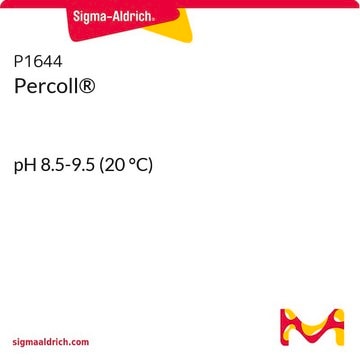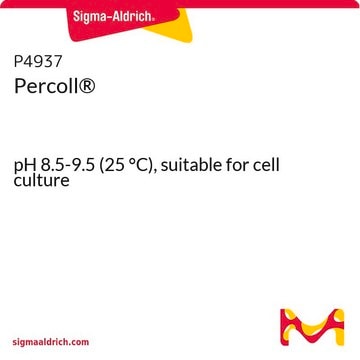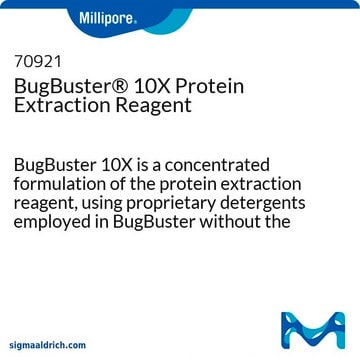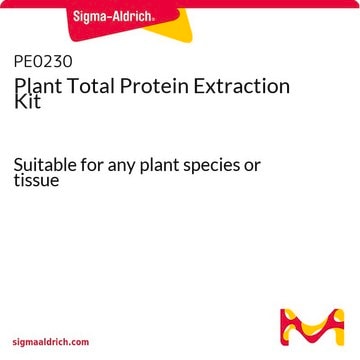CPISO
Chloroplast Isolation Kit
isolation of intact chloroplasts from leaves
Synonyme(s) :
Chloroplast Purification Kit, Isolation Kit for Chloroplast, Kit for Chloroplast Isolation
Se connecterpour consulter vos tarifs contractuels et ceux de votre entreprise/organisme
About This Item
Code UNSPSC :
12352200
Nomenclature NACRES :
NA.32
Produits recommandés
Niveau de qualité
Technique(s)
centrifugation: suitable
Conditions d'expédition
wet ice
Température de stockage
2-8°C
Description générale
The Chloroplast Isolation Kit provides an efficient procedure for isolating intact chloroplasts from plant leaves. The procedure involves mechanical cell wall and cell membrane breakage, removal of cell debris and leaf tissue by filtration, collection of total cell chloroplast fraction by centrifugation, and separation of intact chloroplasts from broken chloroplasts using a Percoll® layer or gradient.
Application
Chloroplast Isolation Kit may be used in chloroplast organelle research to isolate intact chloroplasts from plant leaves for structural and functional studies.
Caractéristiques et avantages
- Specifically formulated buffer - Saves time using easy to follow simple and proven protocols
- Isolates intact chloroplasts - Useful for studies of such processes as carbon assimilation, electron flow and phosphorylation, metabolic transport or protein targeting
- Total organelle protein complement - Useful for functional studies, metabolic transport, proteomic profiling, and genomic applications
- Convenient format - Saves time and reduces waste
Adéquation
The Chloroplast Isolation Kit has been tested for use with spinach, pea, lettuce, cabbage, mangold, and tobacco.
Composants de kit également disponibles séparément
Réf. du produit
Description
FDS
Code de la classe de stockage
10 - Combustible liquids
Certificats d'analyse (COA)
Recherchez un Certificats d'analyse (COA) en saisissant le numéro de lot du produit. Les numéros de lot figurent sur l'étiquette du produit après les mots "Lot" ou "Batch".
Déjà en possession de ce produit ?
Retrouvez la documentation relative aux produits que vous avez récemment achetés dans la Bibliothèque de documents.
Les clients ont également consulté
Xiaoli Luo et al.
PloS one, 8(1), e54002-e54002 (2013-01-22)
In plants, CuZn superoxide dismutase (CuZnSOD, EC l.15.1.1), ascorbate peroxidase (APX, EC 1.11.1.11), and catalase (CAT, EC l.11.1.6) are important scavengers of reactive oxygen species (ROS) to protect the cell from damage. In the present study, we isolated three homologous
The Complete Chloroplast Genome of 17 Individuals of Pest Species <I>Jacobaea vulgaris</I>: SNPs, Microsatellites and Barcoding Markers for Population and Phylogenetic Studies.
Doorduin, L., et al.
DNA Res., 1-13 (2011)
Esau Megias et al.
The protein journal, 37(3), 290-299 (2018-05-29)
Tymovirus is a genus of plant pathogenic viruses that infects several dicotyledonous plants worldwide, causing serious diseases in economically important crops. The known cytopathic effect on the host cell organelles involves chloroplast membrane deformation and the induction of vesicles in
Jimena Cascales et al.
Life (Basel, Switzerland), 7(4) (2017-11-23)
The use of molecular markers with inadequate variation levels has resulted in poorly resolved phylogenetic relationships within Ilex. Focusing on southern South American and Asian species, we aimed at contributing informative plastid markers. Also, we intended to gain insights into
Yanzhong Luo et al.
Frontiers in plant science, 11, 613-613 (2020-06-13)
The transportation of proteins encoded by nuclear genes from plant cytosol to chloroplast is essential for chloroplast functions. Proteins that have a chloroplast transit peptide (cTP) are imported into chloroplasts via translocases on the outer and inner chloroplast envelope. How
Notre équipe de scientifiques dispose d'une expérience dans tous les secteurs de la recherche, notamment en sciences de la vie, science des matériaux, synthèse chimique, chromatographie, analyse et dans de nombreux autres domaines..
Contacter notre Service technique










